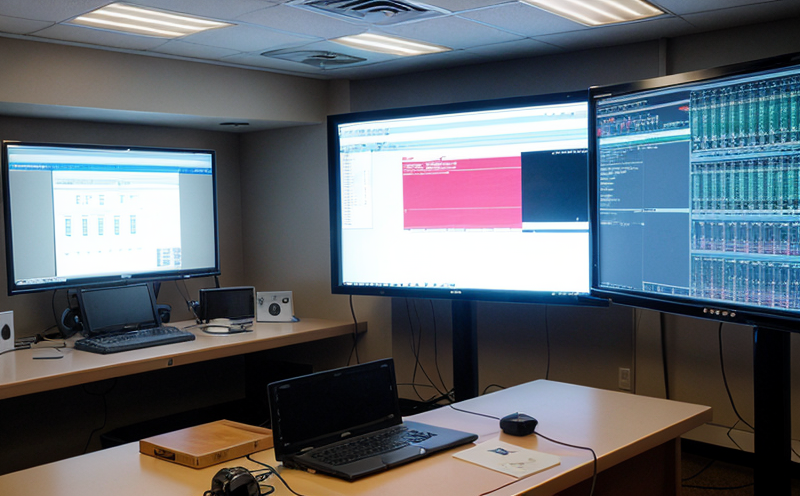IEC 60068 Climatic and Environmental Testing of Control Systems
The IEC (International Electrotechnical Commission) 60068 series of standards provides a robust framework for climatic and environmental testing, ensuring that electrical and electronic products can withstand the challenges they face in real-world environments. For railway signaling and control systems, this standard is particularly critical as these systems operate under extreme conditions. This service focuses on testing the robustness of control systems against various environmental factors to ensure their reliability and safety.
The Railway & Transportation sector demands high levels of trustworthiness from its components, especially in critical applications like signaling and control systems. These systems must function reliably even when exposed to harsh climatic conditions such as extreme temperatures, humidity, rain, and dust. IEC 60068 testing is essential for ensuring that the electronic devices used in these environments perform consistently under adverse conditions.
The testing process involves subjecting the control system components to a series of environmental stress tests designed to mimic real-world conditions. This includes exposure to temperature extremes (from -40°C to 85°C or higher), humidity levels, and other factors that can degrade performance over time. The goal is to identify any weaknesses in the design or manufacturing process before they lead to failures in operational environments.
The testing procedure begins with a thorough review of the system’s specifications and requirements. This step ensures that all relevant parameters are considered during the test. From there, the control systems undergo a series of tests, including:
- Thermal cycling: Rapidly changing temperature to simulate operational conditions.
- Humidity testing: Exposure to high humidity levels for extended periods.
- Rain and dust ingress protection: Simulating exposure to outdoor environments where rain or dust particles may enter the system.
- Vibration tests: To ensure that the control systems can withstand mechanical stress during transportation and operation.
Once testing is complete, detailed reports are generated for each test performed. These reports document any issues found during testing, along with recommendations for improvement if necessary. The comprehensive nature of IEC 60068 ensures that only the most robust systems pass these tests, making them suitable for use in railway signaling and control applications.
The Railway & Transportation sector relies heavily on reliable electronic components to ensure safe and efficient operations. By adhering to international standards like IEC 60068, manufacturers can demonstrate their commitment to quality and reliability. This service plays a crucial role in maintaining the integrity of railway signaling and control systems by ensuring they meet stringent environmental testing requirements.
Scope and Methodology
The scope of IEC 60068 climatic and environmental testing for railway signaling and control systems includes:
| Test Type | Description |
|---|---|
| Thermal Cycling | Involves rapid changes in temperature to simulate real-world operational conditions. |
| Humidity Testing | Exposes the control systems to high humidity levels for extended periods. |
| Rain and Dust Ingress Protection | Simulates exposure to outdoor environments where rain or dust particles may enter the system. |
| Vibration Tests | Ensures that the control systems can withstand mechanical stress during transportation and operation. |
The methodology for conducting these tests involves:
- Thorough review of the system’s specifications and requirements.
- Subjecting the control systems to a series of environmental stress tests designed to mimic real-world conditions.
- Generating detailed reports for each test performed, documenting any issues found during testing along with recommendations for improvement if necessary.
The comprehensive nature of IEC 60068 ensures that only the most robust systems pass these tests, making them suitable for use in railway signaling and control applications. This service provides peace of mind to manufacturers by ensuring their products meet stringent environmental testing requirements.
Benefits
- Enhanced Reliability: Ensures that the control systems can operate reliably under adverse conditions, reducing the risk of failures in operational environments.
- Increased Safety: By ensuring that the electronic components used in railway signaling and control systems are robust against environmental factors, this service contributes to overall safety.
- Improved Quality Assurance: The detailed testing process helps manufacturers identify any weaknesses in their designs or manufacturing processes early on, allowing for improvements before products reach the market.
- Increased Customer Satisfaction: By providing robust and reliable products, customers can trust that these systems will perform consistently over time, leading to higher satisfaction levels.
- Compliance with International Standards: Adhering to IEC 60068 ensures compliance with internationally recognized standards, which is essential for global markets.
The benefits of this service extend beyond just the immediate product; they also contribute to long-term sustainability and reliability. By ensuring that control systems can withstand environmental stresses, this service helps manufacturers build a reputation for producing high-quality products that stand the test of time.





